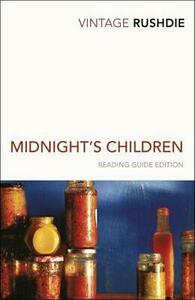You need to sign in or sign up before continuing.
Take a photo of a barcode or cover
challenging
mysterious
slow-paced
Plot or Character Driven:
Character
Strong character development:
No
Loveable characters:
No
Diverse cast of characters:
Complicated
Flaws of characters a main focus:
Complicated
Rushdie mashes absurdity and reality together. His prose is unrelenting. His narrator gleefully rambles and digresses. The world of magic, the main story, and the parallel story of the Indian political landscape circle around one another till their inevitable collision. It's easy to get lost in the multitude of characters, spanning across generations and nations. Just hold on -- the pay off will come when Rushdie's architecture of story and genealogy is revealed in a touching ending.
My first Rushdie novel, rather the first of his where I worked through battling his literary style. Now that I have come to the end of it with no more than a little bruises, I can spend some time putting it in perspective. As you go deeper in, you draw parallels with Forrest Gump, X-men, Cobalt Blue, Sense8 and a treasure trove of other works..and then you realize this came out in 1981, well before the rest. The narration is raw, interspersed with multiple timelines at times, so it is not easy reading at any point in time. Then there are references of historical figures around India's independence and you keep wondering who is real, who isn't. It is a tight ropewalk, reading this book but it is rewarding. I did feel if I had read "India after Gandhi" before I picked this up, I would have a better understanding of the sequence of events. In any case, Rushdie makes it as grand as the game of thrones with many characters meeting their unique fates and doesn't compromise on the storyline.
I think this novel is worth reading but it needs to be read slowly. And possibly with Sparknotes. I appreciate the novel and, after discussing it with others in a class, realize that it is a major work of fiction, but I would not have picked it up on my own and finished it.
This is my initial review. I really disliked it. But I agree with other reviewers that after reflection and a little studying of Indian history, I may learn to appreciate it. It’s not typical sort of novel and it’s not an easy read. Sparknotes offers insight and analysis. But for now, the two stars remain.
I don't know where to start right now, so I'll start once I know.... Soon...
adventurous
dark
emotional
funny
reflective
medium-paced
Plot or Character Driven:
A mix
Strong character development:
Yes
Loveable characters:
Complicated
Diverse cast of characters:
Yes
Flaws of characters a main focus:
Yes
I managed to smuggle a copy from Nepal. Funny how such an undeveloped country, a scarred product of a coup only ten years past, is less restrictive when it comes to censorship issues than the U.A.E., which currently boasts the tallest building in the world (by far). Perhaps that's an unfair comparison, since Nepal is by no means even remotely a Muslim country; there would be little offense on that front. And it may be fair to say that Nepal is not a big fan of her neighbor India!
Anyway, I will have to give this book a lot of serious thought, and I'll probably have to give it the second or third read that it requires and deserves. It certainly didn't win the "Booker of Bookers" for nothing. I'm afraid it raises a new standard for my own judgments!
Complexity of a Dickens novel... and the historical relevance. I will have to read up more on India's tumultuous 20th century history in order to gain a proper perspective. Let's just say that the novel's scope is vast, and no one is left innocent. Sets the stage for the enmity between India and Pakistan, and the parallels between the main character, Saleem, and the birth of India's independence are fascinating without being a 1:1 allegorical ratio. Often, allegory can become tiresome, used as a blanket to hide a lack of vision. Or a refusal to accept the real world and its greys. Midnight's Children never resorts to literary tricks.
Again, it deserves another read. But it is clearly one of the most important books of the 20th century, and not to be missed.
Anyway, I will have to give this book a lot of serious thought, and I'll probably have to give it the second or third read that it requires and deserves. It certainly didn't win the "Booker of Bookers" for nothing. I'm afraid it raises a new standard for my own judgments!
Complexity of a Dickens novel... and the historical relevance. I will have to read up more on India's tumultuous 20th century history in order to gain a proper perspective. Let's just say that the novel's scope is vast, and no one is left innocent. Sets the stage for the enmity between India and Pakistan, and the parallels between the main character, Saleem, and the birth of India's independence are fascinating without being a 1:1 allegorical ratio. Often, allegory can become tiresome, used as a blanket to hide a lack of vision. Or a refusal to accept the real world and its greys. Midnight's Children never resorts to literary tricks.
Again, it deserves another read. But it is clearly one of the most important books of the 20th century, and not to be missed.
I am rarely defeated by a good book. This one did. After reaching the half-way point, I realized that I didn't like the character, didn't care what happened to him, and would rather read a history book about partition than Rushdie's almost too-clever, turgid prose. I skimmed to the end (and won't insert a spoiler).
I rated it 3 stars, because it's clearly a well constructed book, but my enjoyment/satisfaction level is barely a single star. Time to move on to another Rushdie book and see if I can stomach all that high-fallutin' prose with a different plot.
I rated it 3 stars, because it's clearly a well constructed book, but my enjoyment/satisfaction level is barely a single star. Time to move on to another Rushdie book and see if I can stomach all that high-fallutin' prose with a different plot.



